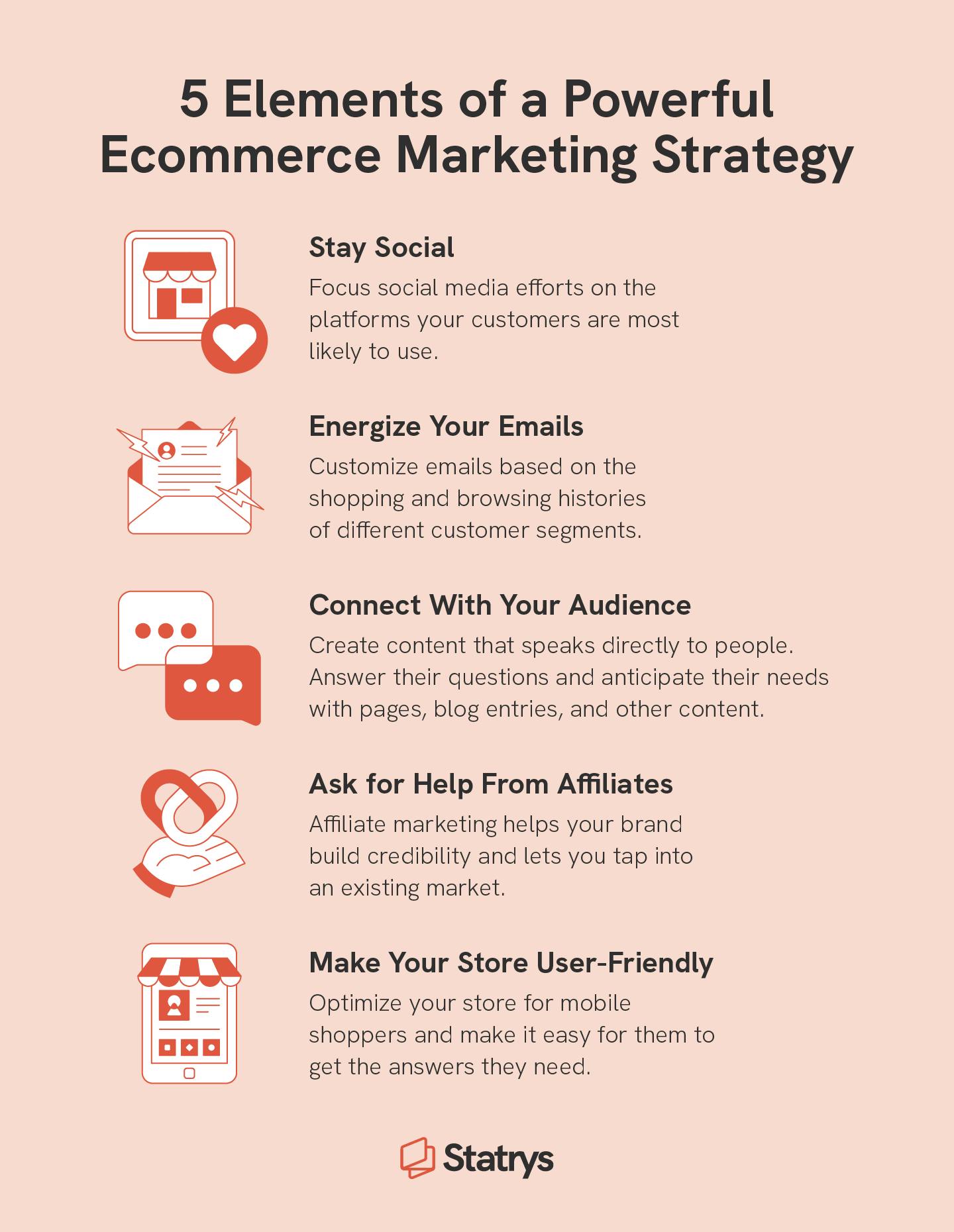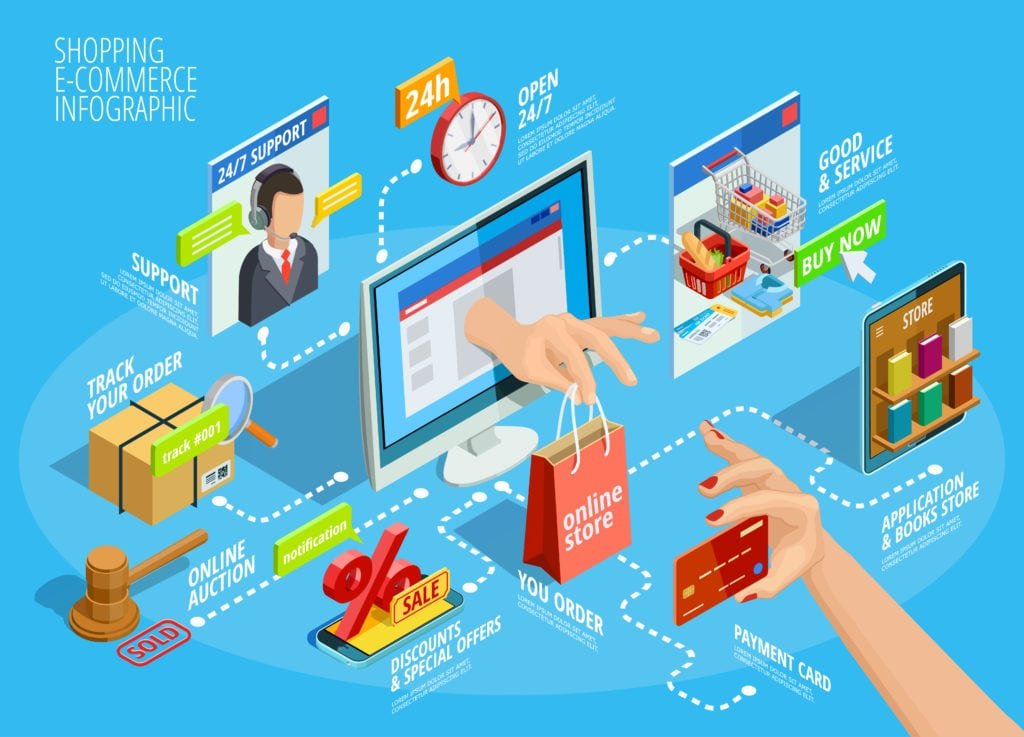An e-commerce marketing strategy is essential for your startup to attract customers, build brand awareness, drive sales, and stay competitive in the online marketplace.
Starting a new business is exciting, but challenging. For startups, competing in the crowded online market can be tough. An effective e-commerce marketing strategy can be your roadmap to success. It guides you on how to attract and retain customers.
It also helps you understand your market and stand out from competitors. A well-planned strategy ensures you make smart decisions and use resources wisely. It’s not just about selling products. It’s about building relationships and trust with your audience. Without a strategy, your efforts may lack direction and impact. So, let’s explore why a strong e-commerce marketing strategy is essential for your startup’s growth and success.
Importance Of E-commerce Marketing
Creating a strong e-commerce marketing strategy for your startup is crucial. It helps your business grow in a competitive online market. A well-planned strategy can improve your online presence and boost sales. Below, we will explore the importance of e-commerce marketing.
Boosting Online Presence
A strong online presence is essential for your startup. It helps potential customers find your products easily. Using SEO techniques can improve your search engine ranking. This means your website will appear higher in search results.
- Optimize your website with relevant keywords.
- Create quality content that attracts visitors.
- Use social media to promote your products.
Engage with your audience on various platforms. This builds trust and increases brand awareness. A good online presence sets your startup apart from competitors.
Driving Sales And Revenue
An effective e-commerce marketing strategy can drive sales and increase revenue. By targeting the right audience, you can attract more customers. Use data analytics to understand customer behavior.
- Identify popular products and trends.
- Offer personalized recommendations to customers.
- Implement email marketing campaigns.
These methods can lead to higher conversion rates. More visitors will turn into paying customers. This growth in sales directly impacts your revenue.
Additionally, consider offering promotions and discounts. This encourages customers to make a purchase. A well-executed strategy can transform your startup’s financial health.

Credit: statrys.com
Understanding Your Target Audience
In the world of e-commerce, knowing your target audience is crucial. It helps you tailor your marketing efforts to meet their needs. This focus can boost engagement and drive sales. Let’s explore how to understand your target audience better.
Identifying Customer Needs
First, identify what your customers want. Conduct surveys and gather feedback. This data reveals their pain points and preferences. Use this information to create products that solve their problems.
Analyze customer reviews and comments. Look for common themes and complaints. This insight helps you improve your offerings. Happy customers are more likely to return and recommend your brand.
Segmenting Your Market
Next, segment your market. Divide your audience into smaller groups based on characteristics. These can include:
- Age
- Gender
- Location
- Interests
- Buying behavior
Market segmentation allows for more personalized marketing. Each group receives tailored messages that resonate with them. This increases the chances of conversion.
For example, younger audiences may prefer social media ads. Older audiences might respond better to email marketing. Adjust your strategies accordingly to maximize impact.
Use tools like Google Analytics to track and analyze audience behavior. This data helps refine your segments over time. Effective segmentation leads to more targeted and successful marketing campaigns.
Building Brand Awareness
Building brand awareness is crucial for your startup’s success. It helps people recognize and remember your brand. A solid e-commerce marketing strategy can make your brand stand out. Let’s delve into how to build brand awareness effectively.
Creating A Strong Brand Image
Creating a strong brand image starts with consistency. Use the same logo, colors, and fonts across all platforms. This makes your brand easily recognizable. A well-designed logo and a catchy tagline can work wonders.
Next, focus on your brand’s voice. Is it friendly, professional, or quirky? Stick to this tone in all your communications. This consistency helps build trust with your audience.
Also, your product photos and descriptions matter. High-quality images and clear descriptions reflect your brand’s professionalism. They also help customers understand what you’re selling.
Utilizing Social Media
Social media is a powerful tool for building brand awareness. Create profiles on platforms like Facebook, Instagram, and Twitter. Post regularly to keep your audience engaged.
Use social media to tell your brand’s story. Share behind-the-scenes photos, customer testimonials, and product updates. This humanizes your brand and makes it relatable.
Engage with your followers. Reply to comments and messages promptly. This interaction shows that you care about your customers. It also builds a community around your brand.
Consider running social media ads. They can reach a broader audience and bring more visibility to your brand. Make sure your ads are visually appealing and have a clear call-to-action.
Below is a quick summary of the key points:
| Aspect | Action |
|---|---|
| Brand Image | Consistent logo, colors, fonts, voice |
| Product Presentation | High-quality photos, clear descriptions |
| Social Media | Active profiles, regular posts, engagement |
| Social Media Ads | Visually appealing, clear call-to-action |
Content Marketing Strategies
Effective content marketing strategies are crucial for the success of any e-commerce startup. These strategies help you attract, engage, and retain customers. By focusing on high-quality content, you can build trust and authority in your industry. Below are some key content marketing strategies that you should consider.
Blogging And Seo
Blogging is a powerful way to generate organic traffic. By writing useful and engaging blog posts, you can attract potential customers. Each blog post should target specific keywords related to your products. This improves your search engine rankings, making it easier for people to find your site.
Consider these steps for an effective blogging strategy:
- Research and use relevant keywords.
- Create high-quality, original content.
- Publish regularly.
- Optimize your posts with meta descriptions and alt text.
By following these steps, you can improve your visibility and attract more visitors to your site.
Email Marketing
Email marketing is an essential tool for e-commerce startups. It allows you to reach customers directly and keep them informed about new products and promotions. An effective email marketing strategy can drive traffic and increase sales.
Here are some tips for successful email marketing:
- Build a quality email list.
- Create engaging subject lines.
- Personalize your emails.
- Provide valuable content.
- Include clear calls-to-action.
By implementing these tips, you can enhance your customer engagement and boost your sales.
Leveraging Social Media
Leveraging social media is crucial for your e-commerce startup. It helps you connect with your audience. Social media platforms like Facebook, Instagram, and Twitter offer great opportunities. These platforms enable you to reach a wider audience. Here are some key strategies to consider:
Engaging With Customers
Engaging with customers on social media builds strong relationships. Respond to comments and messages quickly. This shows customers that you care. Share user-generated content to encourage more interaction. Ask questions and create polls to spark conversations. This keeps your audience engaged and interested.
| Platform | Engagement Tactics |
|---|---|
| Live videos, polls, and Q&A sessions | |
| Stories, interactive stickers, and reels | |
| Reply to tweets, retweets, and Twitter chats |
Influencer Partnerships
Influencer partnerships can greatly benefit your startup. Collaborate with influencers who align with your brand. Influencers have loyal followers who trust their recommendations. This can lead to increased brand awareness and sales. Start by identifying relevant influencers in your niche.
- Micro-influencers: 1,000 to 10,000 followers
- Mid-tier influencers: 10,000 to 100,000 followers
- Macro-influencers: 100,000 to 1 million followers
Each type of influencer offers unique benefits. Micro-influencers provide more personal interaction. Mid-tier influencers have a wider reach. Macro-influencers offer significant exposure. Choose the type that fits your marketing goals.

Credit: www.dash.app
Utilizing Paid Advertising
Utilizing paid advertising can significantly boost your startup’s visibility. Paid ads allow you to reach a specific audience quickly. This approach can drive traffic, generate leads, and increase sales. Let’s explore two main channels for paid advertising: Google Ads and Social Media Ads.
Google Ads
Google Ads is a powerful tool for e-commerce marketing. It targets users actively searching for your products. You can bid on keywords relevant to your business. When users search for these keywords, your ad appears in the search results.
Google Ads offers:
- High-intent audience targeting
- Measurable results with detailed analytics
- Flexible budgeting options
Use these tips to make the most of Google Ads:
- Choose relevant keywords carefully.
- Create compelling ad copy.
- Optimize landing pages for conversions.
- Monitor and adjust your campaigns regularly.
Social Media Ads
Social media ads tap into platforms like Facebook, Instagram, and LinkedIn. These platforms offer extensive targeting options based on demographics, interests, and behaviors.
Benefits of social media ads include:
- Wide reach and high engagement
- Visual and interactive ad formats
- Precise audience targeting
To succeed with social media ads, follow these steps:
- Identify your target audience.
- Choose the right platform for your business.
- Create eye-catching visuals and compelling copy.
- Analyze performance and tweak your strategy.
Both Google Ads and Social Media Ads can drive significant traffic to your e-commerce site. A well-planned paid advertising strategy can help your startup grow quickly and efficiently.
Measuring Marketing Success
Measuring marketing success is crucial for any startup’s e-commerce strategy. Understanding how well your marketing efforts are performing helps refine your approach. It can also guide future decisions, ensuring you achieve your business goals.
Key Performance Indicators
Key Performance Indicators (KPIs) are essential in tracking your marketing success. KPIs provide specific metrics to measure your campaign’s effectiveness. Here are some important KPIs to consider:
- Conversion Rate: The percentage of website visitors who complete a desired action.
- Customer Acquisition Cost (CAC): The cost to acquire a new customer.
- Average Order Value (AOV): The average amount spent by customers per transaction.
- Customer Lifetime Value (CLV): The total revenue expected from a customer over their lifetime.
- Return on Investment (ROI): The profit generated from marketing efforts relative to the cost.
Analyzing Data And Metrics
Analyzing data and metrics helps us understand what works and what doesn’t. This analysis allows you to make data-driven decisions. Here are some steps to consider:
- Collect Data: Use tools like Google Analytics, Facebook Insights, and email marketing platforms.
- Organize Information: Create a system to track and store your data.
- Compare Metrics: Look at historical data to identify trends and patterns.
- Identify Weaknesses: Determine which areas need improvement.
- Adjust Strategies: Make necessary changes to optimize your marketing efforts.
Understanding your marketing data is essential for growth. It ensures your startup continues to evolve and meet customer needs.

Credit: www.cwstechnology.com
Adapting To Market Trends
Market trends change quickly. For a startup, staying updated is vital. An e-commerce marketing strategy helps in keeping up with these changes. It ensures that your business remains relevant and meets customer expectations.
Staying Competitive
To stay competitive, your startup needs to be aware of current trends. Knowing what your competitors are doing can help you offer better services. This could mean new products, better customer service, or more attractive pricing.
- Monitor competitor activities
- Analyze market data
- Update your strategies regularly
Innovating Marketing Techniques
Innovation in marketing is essential for growth. Your e-commerce marketing strategy must include new techniques. These could be social media campaigns, influencer partnerships, or targeted ads.
| Technique | Benefit |
|---|---|
| Social Media Campaigns | Broader audience reach |
| Influencer Partnerships | Increased trust and visibility |
| Targeted Ads | Higher conversion rates |
These innovations can set your business apart. They help in attracting more customers and retaining them. This leads to better growth and higher revenues.
Frequently Asked Questions
What Is An E-commerce Marketing Strategy?
An e-commerce marketing strategy is a plan to promote your online store. It aims to increase website traffic, conversions, and sales.
Why Is An E-commerce Marketing Strategy Important?
An e-commerce marketing strategy helps your startup stand out. It attracts customers, boosts sales, and builds brand loyalty.
How Does An E-commerce Strategy Drive Sales?
An effective strategy targets the right audience. It uses SEO, social media, and email marketing to drive traffic and sales.
What Elements Are In An E-commerce Marketing Strategy?
Key elements include SEO, content marketing, social media, email campaigns, and paid advertising. Each element attracts and converts customers.
Conclusion
Crafting an e-commerce marketing strategy is vital for your startup’s success. It helps attract customers, boost sales, and build brand loyalty. Consistent efforts can set your business apart from competitors. Start planning today. Your future success depends on it. Don’t miss out on the benefits.
A good strategy can make a big difference. Stay focused and watch your startup grow.

